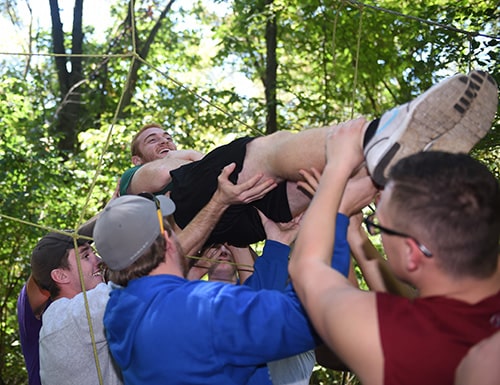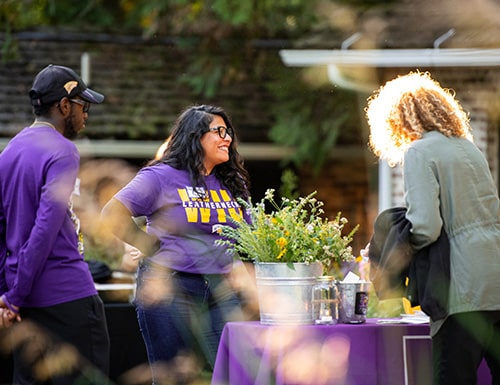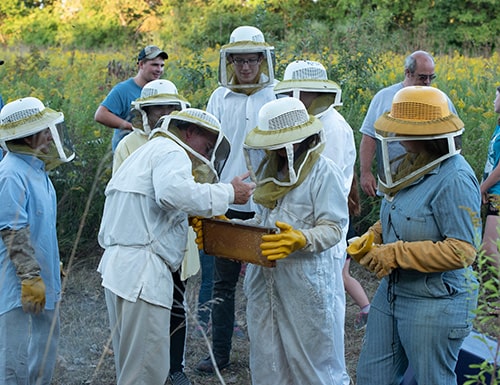Recreation, Park, Tourism, and Hospitality

Horn Field Campus - History, Mission and Values
History
In 1917, early Macomb physician, Dr. Joseph Bacon and his wife Elizabeth Bailey Bacon became the owners of the land on which Horn Field Campus currently resides. When Joseph passed away, the land was given to his son, Lieutenant Colonel William S. Bacon.
Originally intended as a retreat for the Bacon family and friends, several HFC buildings were constructed during the Depression, by the William Bacon family. Given the economic conditions, Bacon was able to hire expert craftsmen cheaply to build “modern for the time” structures. One original cabin was constructed of walnut with a fireplace and a “built–in ice cooler.” By simply removing a loose stone to expose the cooler, guests could have cold refreshments. Unfortunately, that cabin was destroyed by fire and when it was rebuilt, walnut was not used nor was the cabin’s unique cooler replaced. As for the lodge, the wooden flooring is put together with pegs. Two fireplaces are located on either end of the lodge, while pickle jar lamps once hung from the California redwood beams that cross the ceiling. Intricate ironwork adorned the doors of the lodge, showing off the skilled craftsmanship of the men who had worked on the buildings.
In 1946, local Coke bottler and civic minded businessman, Frank J. “Pappy” Horn purchased the property for use as a retreat center for agricultural and outdoor education. Beside owning the Horn Bottling Company, a distributor of Coca-Cola products, Horn was involved in many local organizations, among them the Macomb Rotary, Macomb Elks Club, Macomb School Board, Macomb Chamber of Commerce, Knights of Columbus, American Legion, and the local Boy Scout organization. Horn was also involved with the Defense Recreation Committee during World War II and was instrumental in establishing the local USO Club for soldiers stationed at Camp Ellis.
In May of 1965, the Board of Governors of State Colleges and Universities approved a resolution enabling WIU to purchase the Hornlea Lodge properties from Frank J. “Pappy” Horn. It was through a generous offer by “Pappy” Horn and monies approved by the Board of Governors, that WIU was able to acquire the property, which at the time had an appraised value of $96,200. Mr. Horn’s generosity helped offset the purchase price and aided WIU in expanding its off-campus land holdings. To honor Mr. Horn for his contribution to WIU, the property was named Frank J. Horn Field Campus.
Since 1965, a number of improvements have been made to enhance the services to WIU students and surrounding community groups. In 1980 with the help of the Youth Conservation Corps, a teams course was developed. In 2001, a climbing tower was constructed, and a high ropes course was added.
WIU events held regularly at the campus include the Wilderness First Responder Course, Outdoor Skills Workshops, Camp Rocky, and contests on the Challenge Course. All of these programs offer a challenge of some sort to the participants. The nationally recognized Wilderness First Responder Course trains students to handle emergencies in remote settings. The Challenge Course includes events from ground level up to forty feet in the trees, among them a climbing and rappelling tower. Cooperation between WIU and local organizations allows people from throughout the area to utilize HFC. Horn Field Campus remains, as it has been since 1965, an asset to WIU and the surrounding community.
Mission
To provide an outdoor educational environment to support the university’s mission of instruction, research and service.
Vision
- Outdoor education – environmental, cultural, historical
- Outreach and marketing
- Leadership development
- Interdepartmental programming
- Technology and the environment – define and lead
Core Values
Compassion

Horn Field Campus supports allowing students to become engaged in compassionate work. Students who work in the Challenge Course learn to demonstrate care and concern toward the well-being of fellow students and others. Horn Field Campus practices Challenge by Choice, which helps participants to be mindful of the physical and emotional safety of themselves and others.
Community

The culture of Horn allows students to engage with the natural world around them. While feeling interdependence with others, students feel their work at Horn also encourages a deeper sense of connection to nature. This community, which prompts stronger relationships with other people and the natural world, brings students closer together.
Growth and Education

The community and culture of Horn Field Campus promote compassion in the growth students experience through educational opportunities. The students who become staff at Horn develop their leadership and service abilities in their work with participants of diverse backgrounds. The compassion and community aspects of Horn promote not only growth and education socially, but also in environmental knowledge and responsibility for our natural resources.

Connect with us: